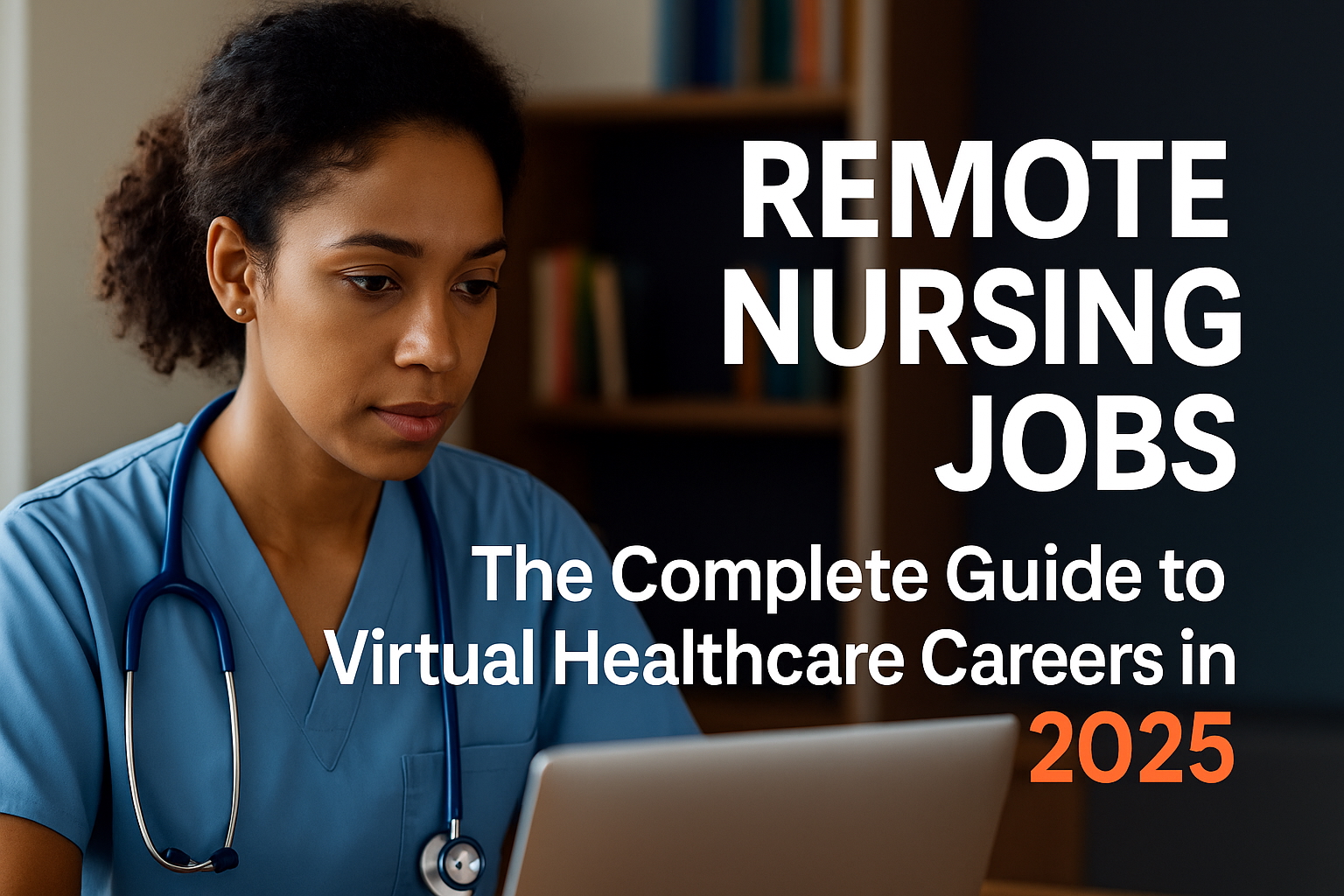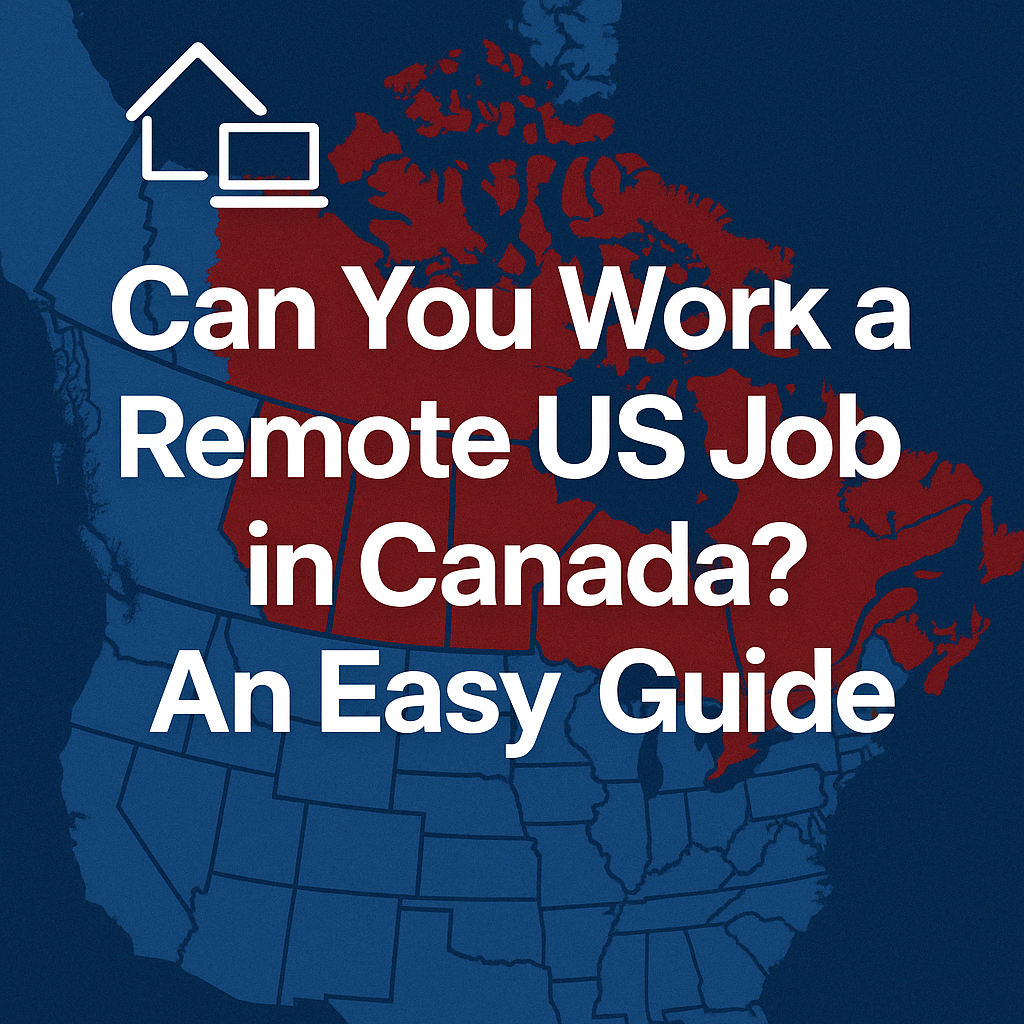Remote nursing has transformed from a niche opportunity to a thriving career path, offering flexibility and work-life balance while allowing healthcare professionals to leverage their clinical expertise in new ways. As telehealth adoption continues to soar in 2025, nurses now have unprecedented access to diverse virtual roles that extend well beyond traditional bedside care. This comprehensive guide explores the expanding landscape of remote nursing jobs, providing insights into available positions, salary expectations, required qualifications, and strategies for landing your ideal remote nursing role.
The Booming Telehealth Industry: Creating New Opportunities for Nurses

The telehealth sector is experiencing remarkable growth, creating abundant opportunities for nurses seeking remote work. According to recent market analysis, the global telehealth market is projected to grow from USD 186.41 billion in 2025 to USD 791.04 billion by 2032, exhibiting a CAGR of 22.9%. North America currently dominates this market with a 45.76% share as of 2024.
This extraordinary expansion is driven by multiple factors, including:
- Advancement in telecommunication technologies
- Greater acceptance of remote healthcare delivery following the pandemic
- Rising prevalence of chronic conditions requiring continuous monitoring
- Healthcare provider shortages in many regions
- Improved insurance coverage for telehealth services
- Growing patient demand for convenient access to care
There has been a notable 34% increase in virtual nursing programs across the United States in just the past year. This rapid growth directly translates to more employment opportunities for nurses looking to transition to remote work environments.
Types of Remote Nursing Jobs Available

Remote nursing encompasses a diverse range of roles that leverage nurses’ clinical knowledge and skills in virtual settings. Here are the most common remote nursing positions available in 2025:
1. Telehealth Nurse
As a telehealth nurse, you’ll use telecommunication technology to provide nursing care to patients from a distance. Responsibilities typically include conducting virtual patient assessments, providing medical advice, monitoring symptoms, and determining whether in-person care is needed. Telehealth nurses often work for hospitals, insurance companies, telehealth platforms, or dedicated telehealth providers.
2. Telephone Triage Nurse
These specialized telehealth nurses assess patients’ medical needs over the phone, provide applicable nursing education and instruction, and make referrals to appropriate medical providers or facilities. Strong communication and decision-making skills are essential for this role, which is among the more common remote nursing positions.
3. Case Manager
Remote case managers coordinate healthcare for patients, ensuring they receive appropriate care while managing chronic conditions and navigating insurance and treatment plans. They typically work with a specific patient population and often collaborate with various healthcare providers to optimize care delivery.
4. Nurse Health Coach
In this growing role, nurses help individuals achieve wellness goals through virtual support and guidance. Health coaches work with clients on weight management, chronic disease prevention, mental health, and lifestyle modifications. The position is ideal for nurses passionate about holistic health and patient empowerment.
5. Utilization Review/Management Nurse
These nurses work with insurance companies and healthcare organizations to ensure patients receive appropriate care while avoiding duplication of services. They perform systematic chart reviews, recommend treatments, and review appeals/denials for medical services.
6. Nurse Educator
Remote nurse educators help prepare nursing students for entering the field, often working for online nursing programs or healthcare organizations. They may develop curricula, conduct research, create continuing education materials, or train staff. This role typically requires extensive clinical experience and strong teaching abilities.
7. Prior Authorization Nurse
Working closely with insurance companies, these nurses assess and review patients’ medical coverage requests for treatments, procedures, and medications. They use critical thinking and nursing knowledge to help patients receive coverage for necessary medical services.
8. Nurse Navigator
As a nurse navigator, you advocate for patients and help them navigate the complex healthcare system. Working remotely, you ensure patients receive high-quality care throughout their healthcare journey, coordinate care among multidisciplinary teams, educate patients on diagnoses, and address barriers to treatment.
9. Clinical Appeals Nurse
These specialists review denied insurance claims, conduct appeal reviews, and generate reports with final decisions. They often follow up with payers to ensure proper claim resolution and advocate for appropriate patient coverage.
10. Medical Coder/Nurse Coder
Nurses with coding expertise can translate and transcribe health documents for recordkeeping purposes. These positions require knowledge of medical terminology and coding systems like ICD-10, CPT, and HCPCS, combined with clinical nursing experience.
11. Virtual Monitoring Nurse
Working in remote centers with videoconferencing technology, these nurses observe patients in hospital settings, answer questions, speak with family members, and ease the burden on bedside nurses by performing tasks that don’t require physical proximity. This innovative model helps retain experienced nurses who might otherwise leave the profession.
Salary Expectations for Remote Nursing Positions

Remote nursing jobs often offer competitive compensation, with salaries varying based on role, experience, location, and employer. According to current data as of May 2025, here are the average annual salaries for common remote nursing positions:
| Position | Average Annual Salary |
|---|---|
| Nurse Consultant | $112,368 |
| Nurse Practitioner | $109,145 |
| Nurse Navigator | $108,000 |
| Nurse Educator | $104,543 |
| Utilization Review Nurse | $102,681 |
| Case Management Nurse | $98,000 |
| Telephone Triage Nurse | $91,375 |
| Telephone Triage Nurse (alternate source) | $87,000 |
| Prior Authorization Nurse | $86,000 |
| Average Remote Nurse | $80,321 |
| Nurse Case Manager | $80,710 |
| Utilization Review Nurse (alternate source) | $77,797 |
| Nurse Health Coach | $77,400 |
| Registered Nurse | $75,523 |
| Clinical Appeals Nurse | $74,875 |
| Nurse Auditor | $65,230 |
| Licensed Practical Nurse | $52,762 |
| Medical Coder | $50,674 |
The average hourly pay for remote nurse positions in the United States is $38.62, with a range typically between $29.57 (25th percentile) to $43.27 (75th percentile). Top earners can make up to $56 per hour or approximately $118,000 annually.
Benefits of Working as a Remote Nurse

The rising popularity of remote nursing positions stems from numerous advantages these roles offer to healthcare professionals:
Enhanced Work-Life Balance
Remote nursing jobs provide unparalleled flexibility, allowing nurses to structure their work around personal commitments. This flexibility is particularly valuable for nurses with families or other responsibilities that make traditional shift work challenging.
Elimination of Commute
Working remotely eliminates daily commutes to healthcare facilities, saving significant time, reducing stress, and decreasing transportation expenses. This benefit is especially meaningful for nurses who previously faced long commutes to hospitals or clinics.
Career Longevity
Virtual nursing roles offer experienced nurses approaching retirement age an opportunity to extend their careers and continue applying their valuable knowledge and expertise. As one administrator noted, “What better way to retain those experienced nurses who might be thinking of retiring or leaving the field early?”
Geographic Freedom
Remote positions often allow nurses to work from anywhere with a reliable internet connection, expanding job opportunities beyond local markets. This can be particularly advantageous for nurses living in areas with limited healthcare employment options.
Improved Patient Access
Telehealth nursing helps bridge healthcare gaps, particularly for patients in rural or underserved areas, those with mobility issues, or individuals who face transportation barriers. Remote nurses play a crucial role in expanding access to care for these populations.
Professional Development
Remote nursing often involves developing new skills in technology, patient education, and virtual communication, which can enhance career growth and versatility. These transferable skills can prove valuable across various healthcare settings.
Challenges of Remote Nursing and How to Overcome Them

While remote nursing offers numerous benefits, it also presents unique challenges that prospective telehealth nurses should consider:
Technology Barriers
Remote nursing relies heavily on technology, and technical issues can disrupt patient care. To overcome this challenge:
- Ensure you have reliable high-speed internet
- Set up a proper home workstation with quality equipment
- Become proficient with telehealth platforms before starting
- Know who to contact for technical support
Patient Engagement Challenges
Building rapport with patients virtually requires different skills than in-person care. Successful remote nurses:
- Use strong verbal communication techniques
- Pay attention to non-verbal cues visible through video
- Practice active listening
- Schedule regular follow-ups to maintain connections
- Provide clear written instructions for patients
Privacy and Security Concerns
Protecting patient information and adhering to HIPAA regulations is crucial in telehealth. Best practices include:
- Using only secure, encrypted platforms for patient communication
- Creating a private workspace free from distractions and eavesdropping
- Following all organizational protocols for data handling
- Completing regular training on information security
Professional Isolation
Remote work can feel isolating compared to the collaborative hospital environment. To combat isolation:
- Join professional nursing networks and online communities
- Participate in virtual team meetings and huddles
- Schedule regular check-ins with colleagues
- Attend professional development events, even virtually
- Maintain connections with former colleagues
Setting Boundaries
Working from home can blur the lines between professional and personal life. Successful remote nurses:
- Establish dedicated workspace separate from living areas
- Set and communicate clear working hours
- Take scheduled breaks throughout the day
- Create end-of-day rituals to transition out of work mode
- Use technology to enforce work-life boundaries (separate work devices/accounts)
Qualifications and Requirements for Remote Nursing Positions

Remote nursing jobs typically require specific qualifications and skills. Here’s what employers generally look for:
Education and Licensure
- Active, unrestricted nursing license (RN, LPN, or NP depending on the role)
- Most positions require at least an associate degree in nursing, with bachelor’s degrees often preferred
- Advanced roles like nurse practitioners require master’s or doctoral degrees
- Multi-state licensure through the Nursing Licensure Compact (NLC) is beneficial for positions serving patients across state lines
Clinical Experience
- Most remote positions require prior clinical experience, typically 2-3 years minimum
- Bedside or direct patient care experience is usually necessary before transitioning to remote work
- Specialty experience may be required for specialized telehealth positions (e.g., cardiac care, oncology)
Technical Skills
- Proficiency with computers and basic troubleshooting
- Experience with electronic health records (EHRs)
- Familiarity with telecommunication tools and video conferencing
- Ability to learn new software platforms quickly
- Basic understanding of telehealth security and privacy requirements
Communication Skills
- Excellent verbal communication abilities
- Strong writing skills for documentation and patient messaging
- Active listening skills
- Ability to build rapport without physical presence
- Clear and concise instruction delivery
Certifications
While not always required, certain certifications can enhance your remote nursing job prospects:
- Ambulatory Care Nursing Certification (includes telehealth component)
- Telehealth certification programs from universities or healthcare organizations
- Specialized certifications relevant to specific roles (case management, utilization review)
How to Find Remote Nursing Jobs

Finding remote nursing positions requires strategic approaches. Here are effective methods for discovering telehealth opportunities:
Specialized Job Boards
Several platforms focus specifically on remote healthcare positions:
- FlexJobs.com – Features vetted remote nursing positions
- Remote.co – Lists work-from-home nursing opportunities
- ZipRecruiter – Allows filtering for remote nursing jobs
- LinkedIn – Offers remote nursing job listings
- Indeed – Has numerous remote nursing positions
Healthcare-Specific Job Sites
- NurseFern.com – Specializes in remote nursing jobs
- Telehealth Nurse Network – Provides resources and job listings for telehealth nurses
- Health system career pages – Many major healthcare systems now hire for remote positions
Networking Strategies
- Connect with nurses already working remotely through LinkedIn or professional associations
- Join telehealth nursing groups on social media
- Attend virtual healthcare conferences focusing on telehealth
- Reach out to nursing school alumni networks
Preparing Your Application
When applying for remote nursing positions:
- Customize your resume to highlight relevant skills (technology proficiency, independent work, communication)
- Demonstrate previous experience that translates to remote work
- Emphasize your self-discipline and time management abilities
- Prepare examples of how you’ve solved problems independently
Tips for Success in Remote Nursing Positions

Thriving in a remote nursing role requires specific strategies:
Create an Effective Home Workspace
- Establish a dedicated, professional workspace free from distractions
- Ensure your background appears professional during video calls
- Invest in ergonomic furniture to prevent physical strain
- Use proper lighting for video consultations with patients
- Maintain strong internet connectivity and have a backup plan
Master Virtual Communication
- Practice clear, concise verbal communication
- Develop skills in “webside manner” – conveying empathy virtually
- Learn to recognize patient concerns through limited visual cues
- Document thoroughly to ensure continuity of care
- Use teach-back methods to confirm patient understanding
Maintain Work-Life Balance
- Set boundaries between work and personal time
- Take scheduled breaks throughout your workday
- Establish a routine that includes physical activity
- Create start and end-of-day rituals to transition between work and personal life
- Use technology tools to manage your schedule effectively
Continue Professional Development
- Pursue continuing education specifically focused on telehealth
- Stay updated on telehealth regulations and best practices
- Join professional organizations for telehealth nurses
- Attend webinars and virtual conferences on telehealth innovations
- Connect with mentors experienced in remote nursing
Develop Technical Proficiency
- Become familiar with multiple telehealth platforms
- Learn basic troubleshooting for common technical issues
- Stay updated on privacy and security best practices
- Practice using peripheral devices that may be part of telehealth services
- Understand how to guide patients through technology challenges
Future Outlook for Remote Nursing
The future of remote nursing appears exceptionally promising, with several key trends shaping the field:
Expanding Job Market
The telehealth market is projected to continue its explosive growth, reaching USD 791.04 billion by 2032. This expansion will create numerous new remote nursing opportunities across various specialties and care models.
Evolution of Roles
Remote nursing roles are becoming increasingly specialized, with new positions emerging to address specific patient populations and healthcare needs. We’re seeing growth in areas like remote chronic care management, virtual mental health nursing, and specialized telehealth triage.
Integration with Traditional Care
Rather than remaining separate from traditional healthcare delivery, remote nursing is becoming more integrated with in-person care. Hybrid models that combine virtual and in-person nursing are becoming common, creating new flexible career paths for nurses.
Technological Advancements
Improvements in remote monitoring devices, artificial intelligence, and telehealth platforms will continue to enhance the capabilities of remote nurses. These advancements will enable more comprehensive patient care from a distance and create new specialized remote nursing roles.
Regulatory Changes
As telehealth becomes standard practice, regulatory frameworks are evolving to better accommodate remote nursing practice across state lines. The expansion of the Nursing Licensure Compact and other regulatory changes will likely create a more unified approach to telehealth nursing licensure.
Conclusion
Remote nursing jobs represent one of the most significant developments in the nursing profession in recent years. These positions offer experienced nurses new career pathways with improved work-life balance, competitive compensation, and opportunities to leverage their clinical expertise in innovative ways.
While remote nursing presents certain challenges, the benefits-flexibility, elimination of commuting, geographic freedom, and career longevity-make it an increasingly attractive option for many healthcare professionals. As telehealth technology continues to advance and patient acceptance grows, remote nursing will likely become an even more integral part of healthcare delivery.
For nurses considering this career transition, now is an excellent time to develop the necessary skills, pursue relevant certifications, and begin exploring the diverse remote opportunities available. With proper preparation and understanding of what remote nursing entails, nurses can successfully navigate this evolving landscape and find fulfilling roles that match their skills, interests, and lifestyle needs.
Whether you’re an experienced nurse looking for a change or a new graduate interested in alternative career paths, remote nursing offers exciting possibilities for professional growth in our increasingly digital healthcare ecosystem.




